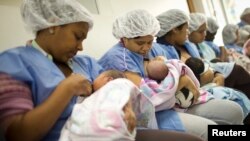Breastfeeding babies within an hour of birth significantly increases their chances of survival, the World Health Organization reports, citing data from 76 countries that find that mother's milk is rich in health-giving nutrients and antibodies.
However, only 40 percent of infants are breastfed in the first hour of life, according to WHO's infant and young child feeding specialist, Laurence Grummer-Strawn.
"The delay of breastfeeding puts the babies at increased risk of infection and ultimately increases their risk of death. Just delaying beyond the first hour can increase mortality by about one-third, and waiting until the second day doubles the rate of mortality," he said.
The worst rates are found in East Asia and the Pacific, where only 32 percent of babies are breastfed in the first hour after birth, Grummer-Strawn said. He added that the numbers are much better in Africa, with eastern and southern Africa seeing average rates of 65 percent.
"What is interesting is this varies tremendously from country to country," he said. "As we look across Africa, you can see some countries that have very low rates, as low as 20 percent, but other countries, as high as 90 percent. Similarly, in Asia, a substantial difference from one country to another country in these rates."
Grummer-Strawn says the difference in rates is not driven by regional patterns, but is mainly driven by the kind of education and medical care prevalent within a country.
The report warns that formula or other drinks must not be given to newborns unless absolutely necessary. It says formula can be dangerous because it sometimes is mixed with contaminated water and delays the infant's first critical contact with his or her mother.




